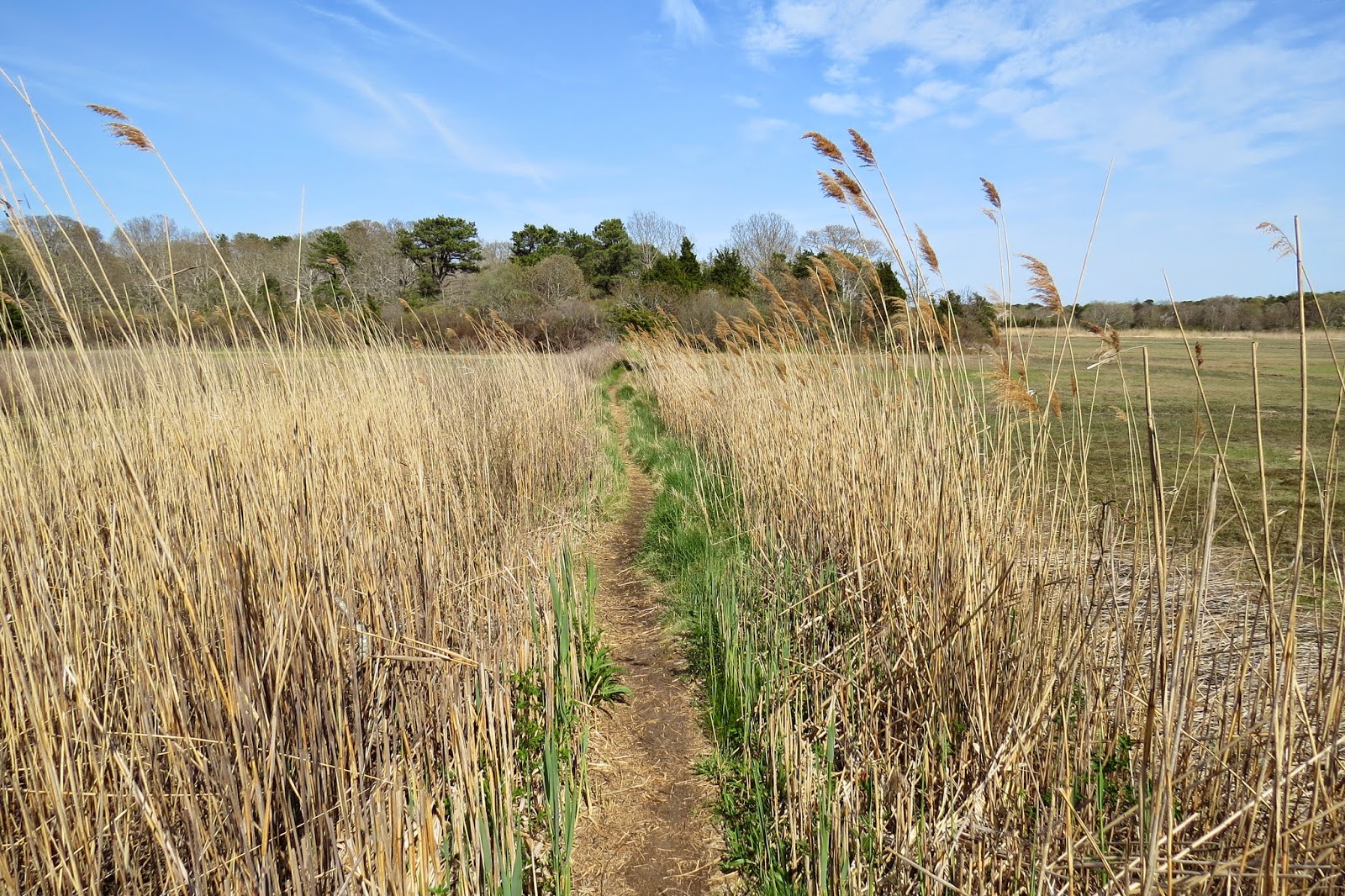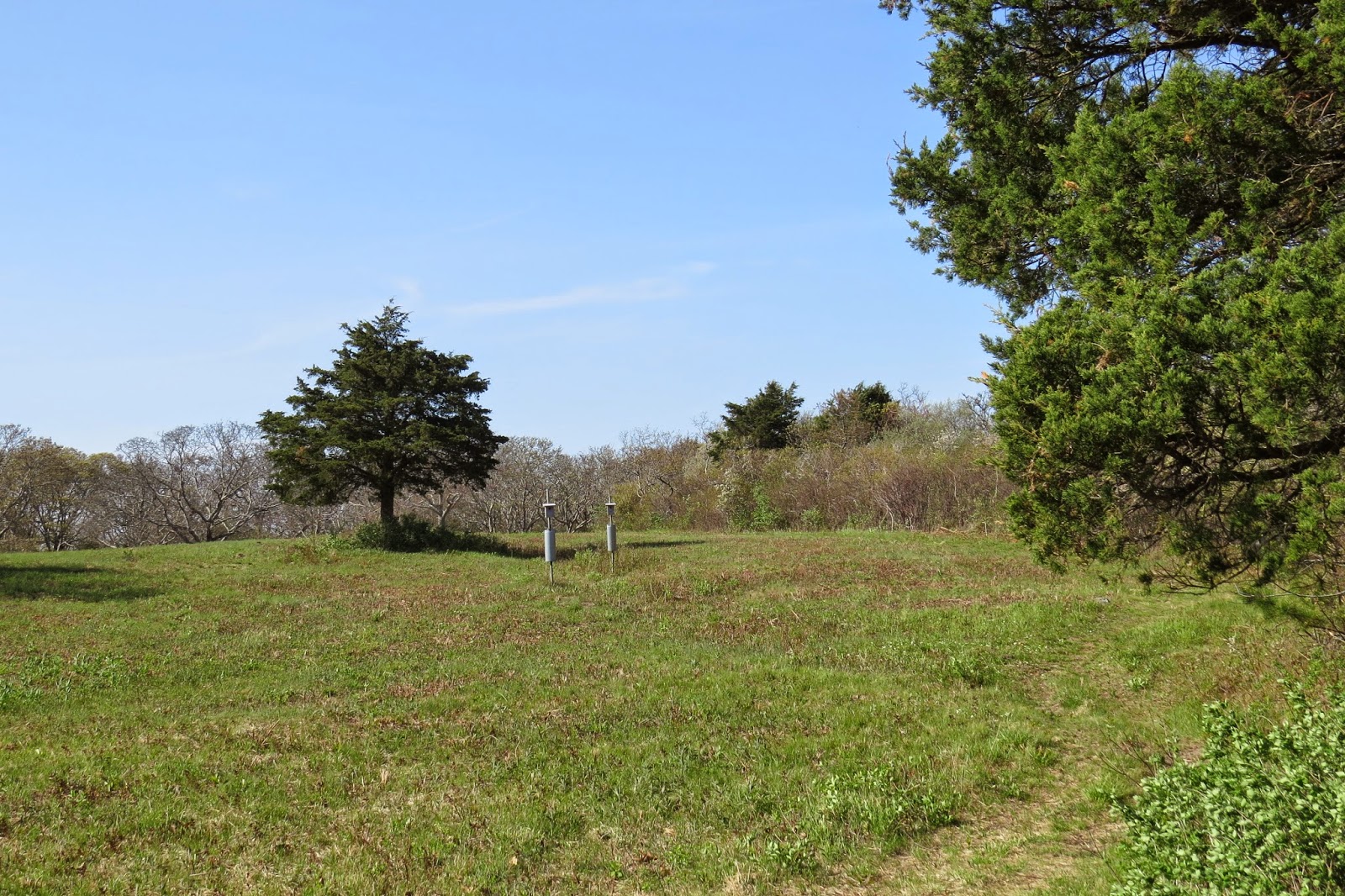There are numerous beautiful preserves on Cape Cod, almost too
many to count. For example, Crowe’s
Pasture is a protected area on Quivet Neck in the Town of Dennis. The pasture consists of open
rolling fields dotted with copses of trees and bushes. Four wheel drive vehicles pass through down to
the beach where Quivet Creek enters Cape Cod Bay.
At low tide trucks can be seen out
on the flats, their owners harvesting delicious oysters.
When I visit the pasture it is without wheels or engines
but on two feet. A trail starts just
past the old cemetery and winds along the marsh. Shortly down from the start, the path crosses an
arm of the marsh on a low berm.
Seawater rushes to and fro through a tidal
cut mid-way along the berm. The gap is spanned by two long wide
boards which become awash during high water.
The view over the low grasses to Quivet Creek is expansive. Ospreys nest on a pole provided by a local
nature group on the far side of the creek.
At the end of the berm the way leads through a mixed forest with an understory of low brambles.
Further on the
path opens to Crowe’s broad pasture where bird houses perch on low squirrel-protected poles.
On a day in late April
I followed a beautiful little Phoebe from bush to bush with my field glasses. Song sparrows voice their soft notes and
robins hop then stop in their constant ground search. Tree swallows dart overhead and hawks soar high above.
In such a peaceful place, it is sometimes possible for me to
lose touch with a growing feeling of despair about the future of the earth. This precious earth we have known since
childhood. The tragedy of the commons is
playing out like a sad drama before our eyes in so many ways.
On the Cape, cod is an ever present icon but
stocks have all but disappeared on Georges Banks and in the Gulf of Maine. Mechanized fleets devastated fishing grounds
starting in the 50’s and 60’s continuing through 1992 when the cod harvest
collapsed.
Our species increasingly dominates, not only on the regional scale of the cape. The effect of our controlling presence is so profound that scientists now recognize that the global ecosystem
is in the midst of the sixth great extinction, the greatest decline in diversity since the dinosaurs disappeared 65 million years ago. Estimates are that 30 to 50% of the species on earth may disappear by
mid-century. We not only crush other
species directly but also devour their habitat.
It is admittedly hard to believe that humans are causing species
extinction at a rate that is over 1000 times the background rate (rate before the appearance of humans) and quite difficult
to imagine that our industries, transportation systems and deforestation practices
are altering the chemistry of entire oceans and changing the climate of the whole world.
As a youth, I viewed nature as independent of towns and
cities. The rural environment was to me
an immutable constant that existed as a comfortable refuge, independent of urban development,
military conflicts and other activities of man.
But over the years my innocence has been punctured with the knowledge that we are
changing the ecosystem on a global scale. It is indeed frightening and overwhelming. So much so that I can understand why so many
simply deny or ignore the vast extent of our impact.
So what do we do? We
proceed with our private lives in a contradiction of activity. We conserve on a local scale. We beautify our homes and gardens, set aside
local conservation trusts, preserve the beaches at the Cape Cod National
Seashore, while we ignore the degradation of the
global ecosystem. We live in a world of
contradictions, enhancing our private surroundings while despoiling the
common.
Oh well, it’s time for my walk on the beach.
I plan to soak up the beauty of the sea and ponder the future of our little earth.







